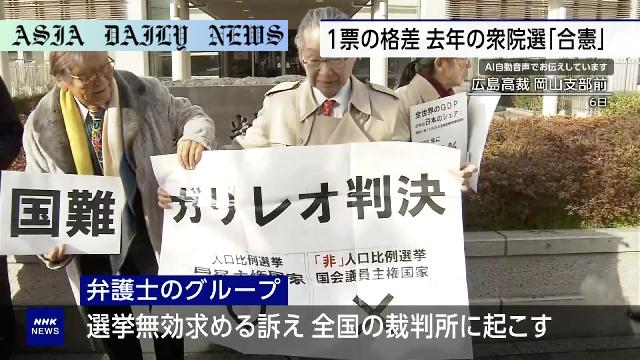vote disparity: Japan court rules vote disparity of up to 2.06 times in the Lower House election is not unconstitutional.
Japan court ruled a 2.06 vote disparity isn’t unconstitutional.
The disparity stems from population dynamics and districting.
Critics argue this violates equality in vote value.

Introduction
On Thursday, Japan’s legal system delivered a verdict that has sparked significant discussion nationwide. The Okayama branch of the Hiroshima High Court ruled that the disparity of up to 2.06 times in the value of votes in the recent Lower House election does not violate the Constitution. This decision emerged alongside rising concerns about fairness in electoral systems and the importance of equal representation for voters in democratic societies.
The Issue of Vote Disparity
At the heart of the debate lies the issue of inequality in vote value. As population changes and demographics fluctuate, some districts experience a higher concentration of people than others. This imbalance has led to disparities in the weight each vote carries. In the case of Japan, certain single-seat districts saw votes from less populated regions carry significantly more influence compared to densely populated areas, reportedly reaching a ratio of up to 2.06.
Court’s Rationale Behind the Decision
Presiding Judge Inoue Kazunari explained the reasoning for the court’s decision. He argued that the current election demarcation system acknowledges the possibility of such disparities arising due to population movement. The system, introduced last year, aims to redistribute seats every 10 years to ensure fairness. Judge Inoue emphasized that the disparity could not be considered unconstitutional unless it expanded remarkably beyond its current levels. He further stated that the increase in disparity had no other cause aside from natural population shifts.
The Plaintiffs’ Argument
Those opposing the ruling have voiced strong objections. A group of lawyers advocating for electoral reform argued that the disparity directly contradicts the principle of equal vote value enshrined in the Constitution. They contended that no citizen’s vote should weigh less or more than another’s, regardless of their district of residence. The lawyers had demanded nullification of election results in single-seat districts due to this issue—an argument that did not sway the court.
Historical Context of the Demarcation System
The disparity in vote value has long been a contentious issue in Japan. The demarcation system was introduced to address this exact problem. According to the framework, districts undergo regular reallocation to account for population growth or decline. Yet, even with the system’s recent adjustments, disparities remain, as seen in the October Lower House election when a gap exceeding 2.0 materialized in 10 separate districts.
Public Reaction and Criticism
Following the decision, critics expressed disappointment and drew parallels to historical instances of judicial failure. Lawyer Masunaga Hidetoshi likened the ruling to the infamous trial of Galileo Galilei, who was wrongly convicted for asserting that the Earth revolved around the sun. This strong statement highlights the frustration felt by those who view the ruling as both regressive and inconsistent with constitutional ideals.
Moving Forward
The debate over vote disparity is far from over. With multiple similar lawsuits filed across the country, the high court’s decision may set a significant precedent. At the same time, it underscores the pressing need for continued electoral reform. Political analysts and democracy advocates will be closely watching further rulings and public discussions to assess how Japan addresses these growing disparities moving forward.
Conclusion
At its core, the debate concerning vote disparity raises timeless questions about democracy, representation, and equality. While the court’s recent decision upholds the current system, it also amplifies the voices of those demanding structural change. As discussions continue, it remains crucial to evaluate electoral systems through the lens of fairness and inclusivity to ensure all citizens receive equitable representation in government.
Commentary
The Significance of Equitable Representation
The recent court decision in Japan regarding the 2.06 vote disparity is more than just a legal ruling; it highlights the larger conversation about what it means to have a fair and representative democracy. Ensuring every citizen’s vote carries equal weight is a cornerstone of democratic legitimacy. When this equilibrium is disrupted, it inevitably raises questions about the very foundation of governance and societal fairness.
Legal Interpretation vs. Democratic Ideals
While the court’s reasoning is legally sound—citing population mobility and the design of the current electoral system—it inevitably clashes with public perception. For many, the idea that a vote in one district can carry double the weight of another undermines the notion of equal participation. This conflict between legal frameworks and democratic ideals often leads to frustration among those who feel their voices have been diminished.
The Broader Implications
What unfolds in Japan may serve as a case study for other democracies grappling with similar issues. The balance between honoring population changes and preserving equality in vote value is not unique to Japan; countries worldwide face comparable challenges. Finding innovative solutions that respect both legal structures and the principle of equality is crucial for fostering trust in electoral systems globally.
A Call for Continued Reform
Ultimately, this ruling should not be seen as an endpoint but rather as a stepping stone toward progress. Governments and judicial systems must remain committed to addressing systemic flaws, particularly when they impact core democratic values. Achieving true fairness in representation may be an iterative process, but continued effort is both necessary and worthwhile.


